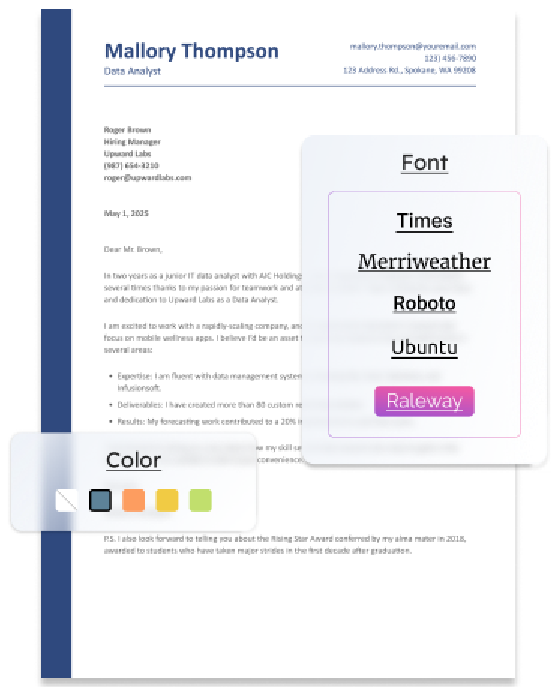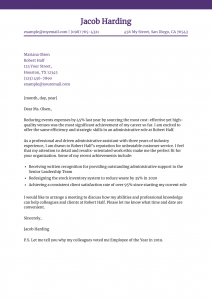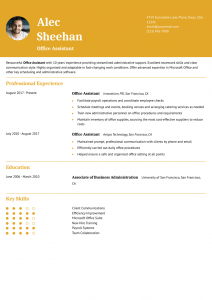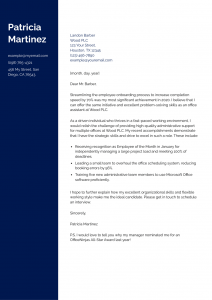When writing your clerical cover letter, focus on how you can help keep office functions running smoothly for the organization that posted the job. Also, emphasize your related skills like customer service, data entry, call routing, or time management.
This guide will help you write a cover letter that gets you interviews for your next clerical job.
Clerical Cover Letter Templates and Examples
Office Clerical Support Cover Letter
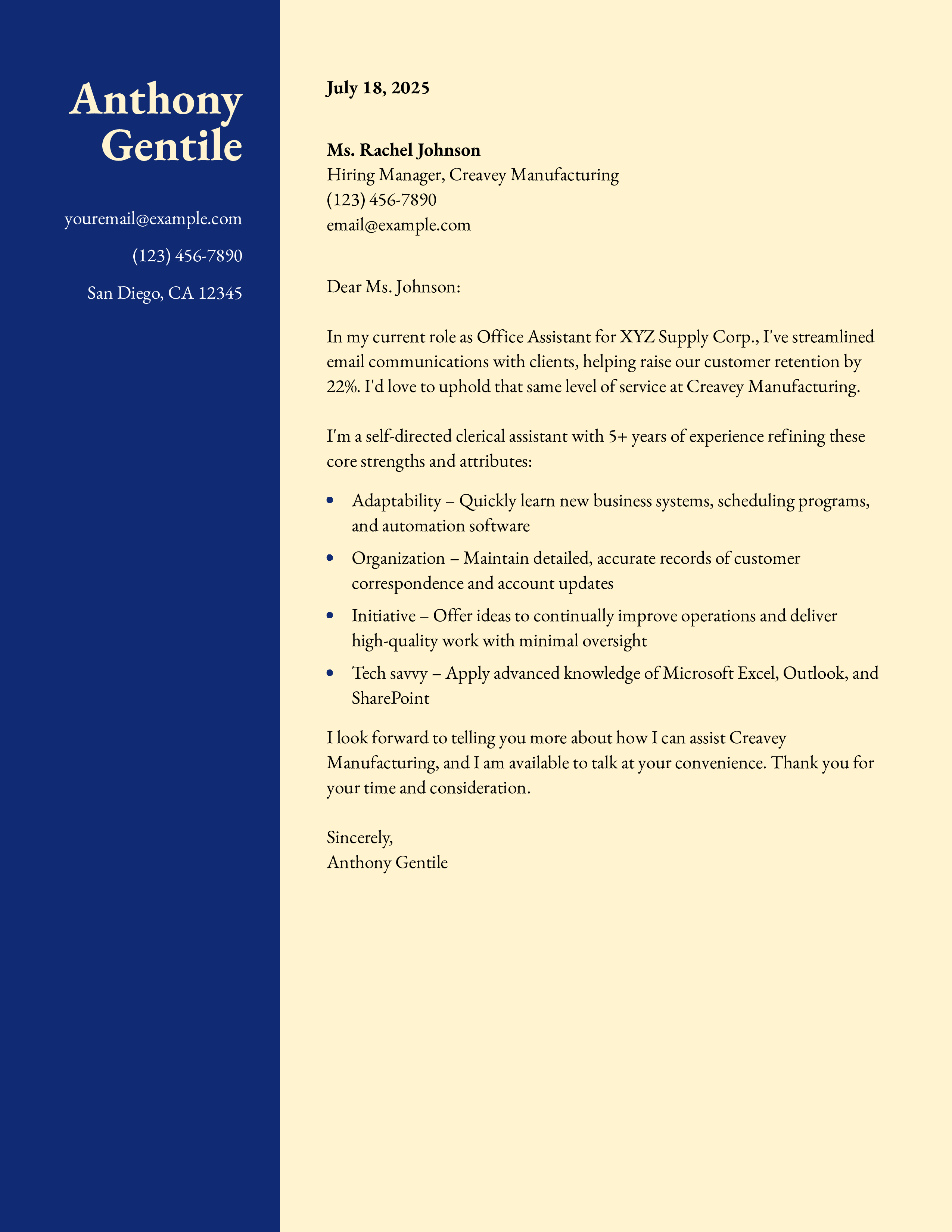
Senior Office Assistant Support Cover Letter
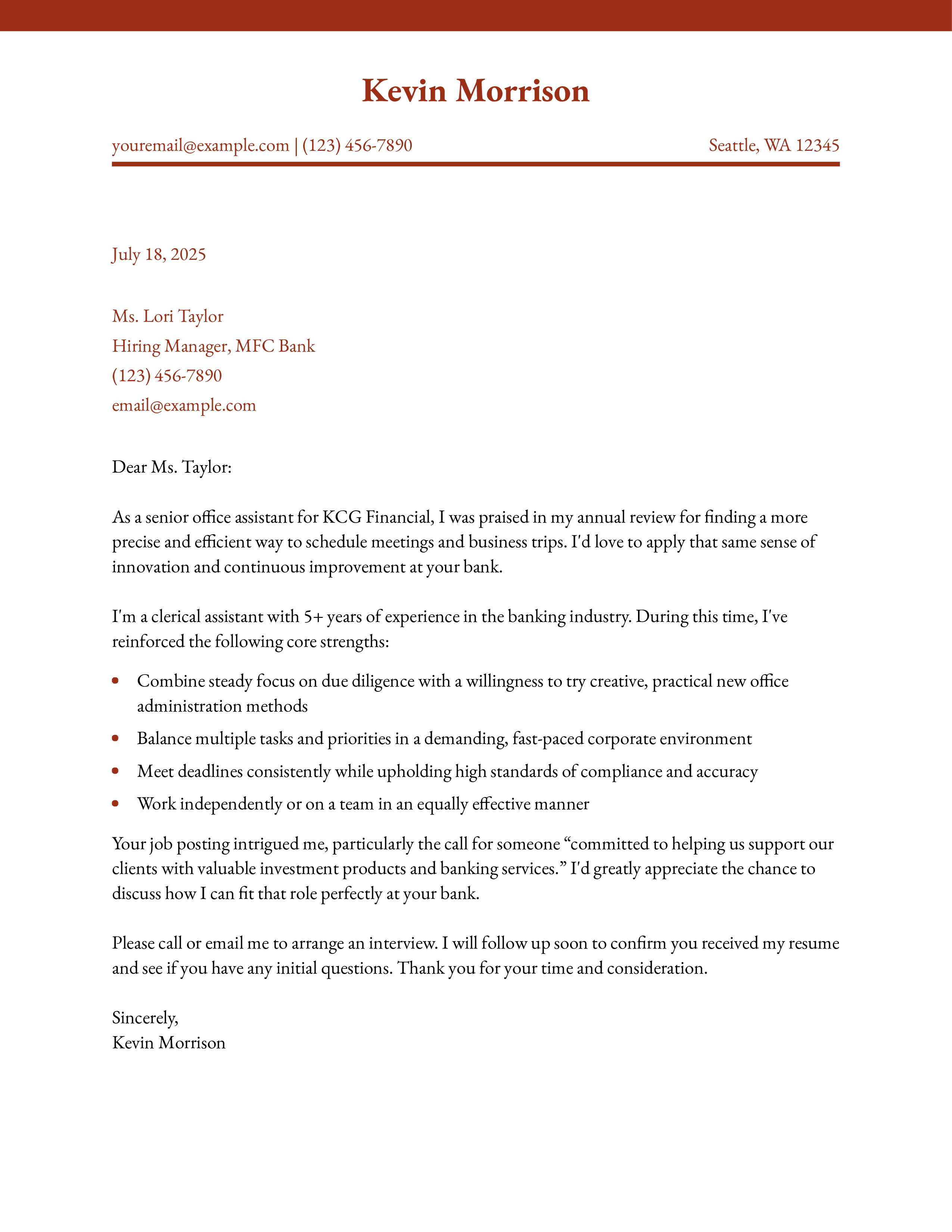
Law Clerk Cover Letter
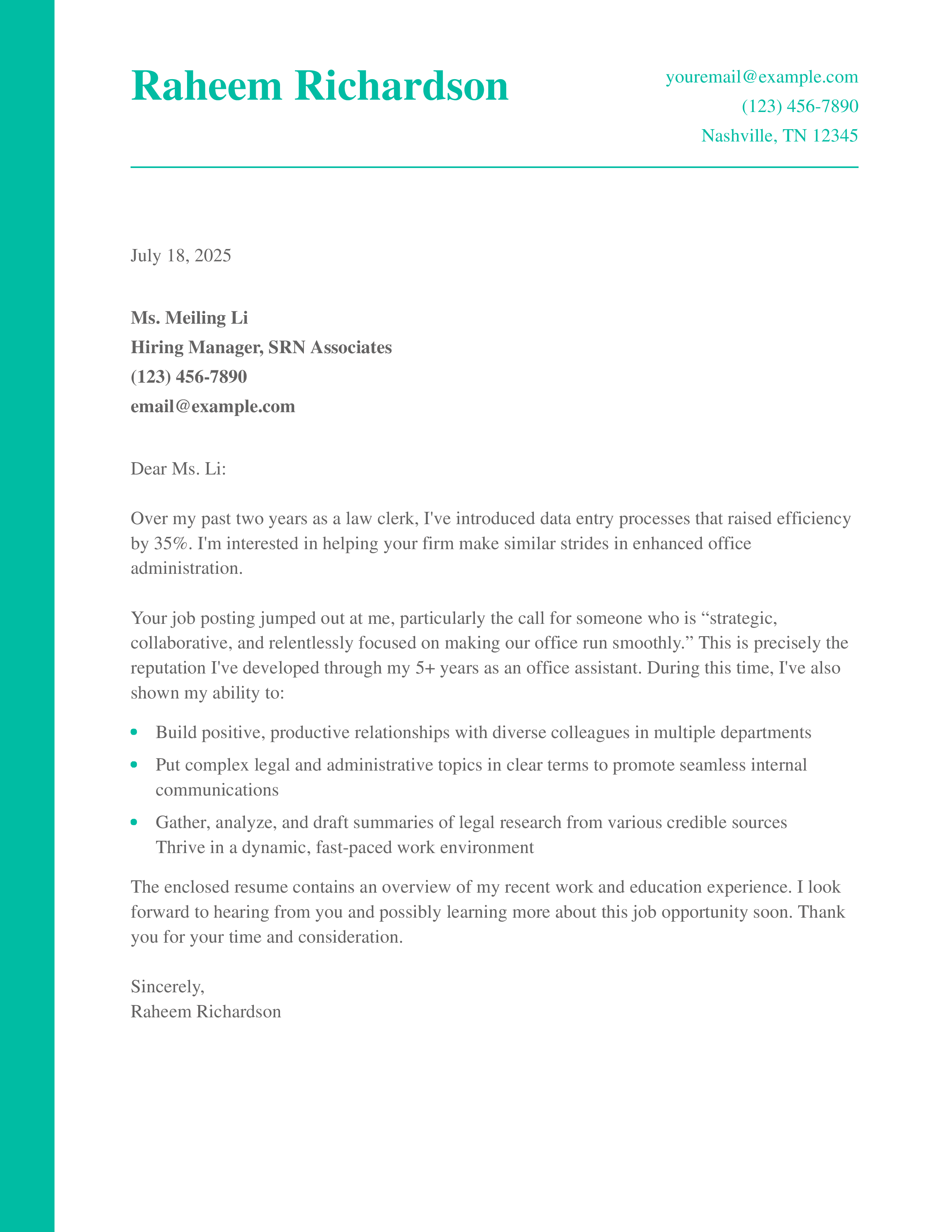
Administrative Clerk Cover Letter
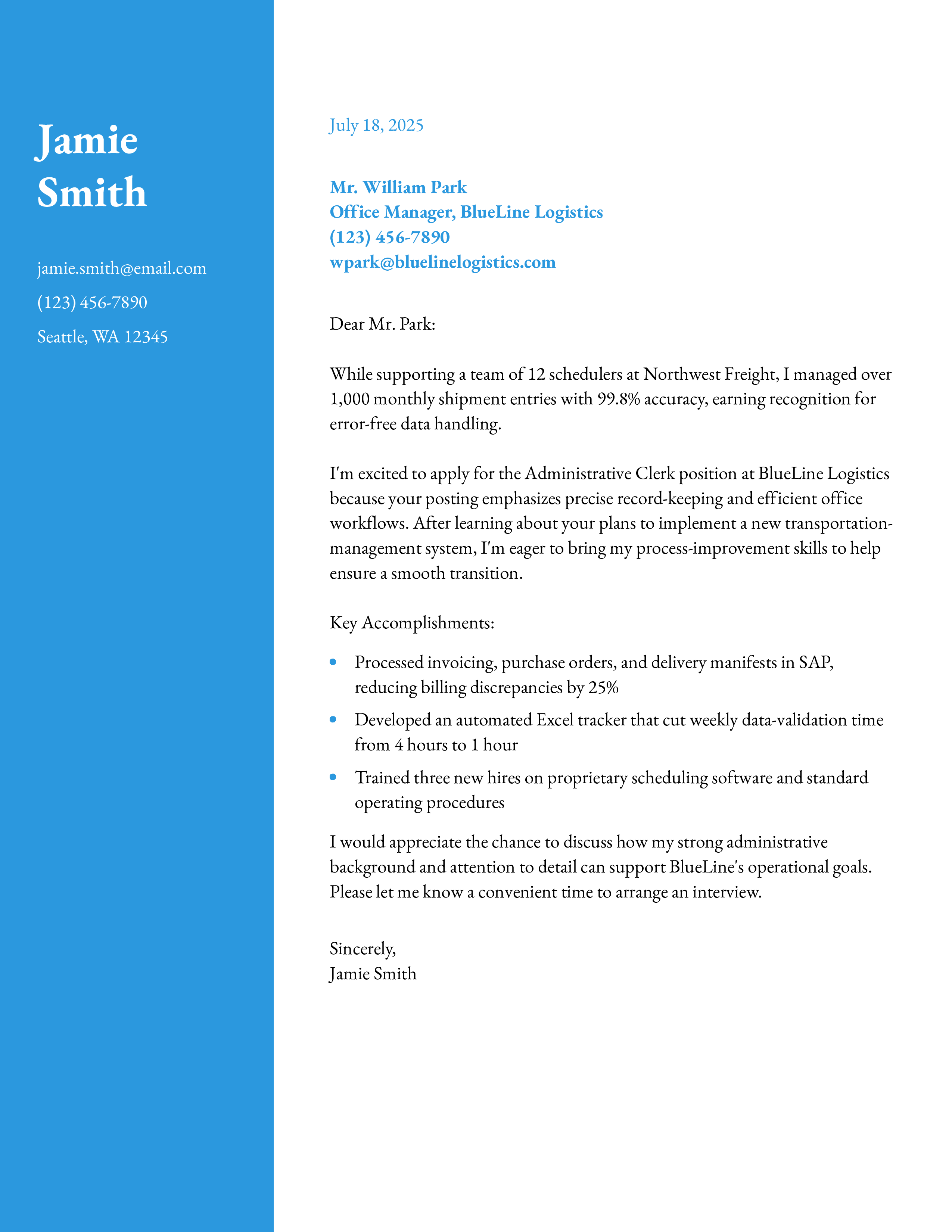
Clerical Associate Cover Letter
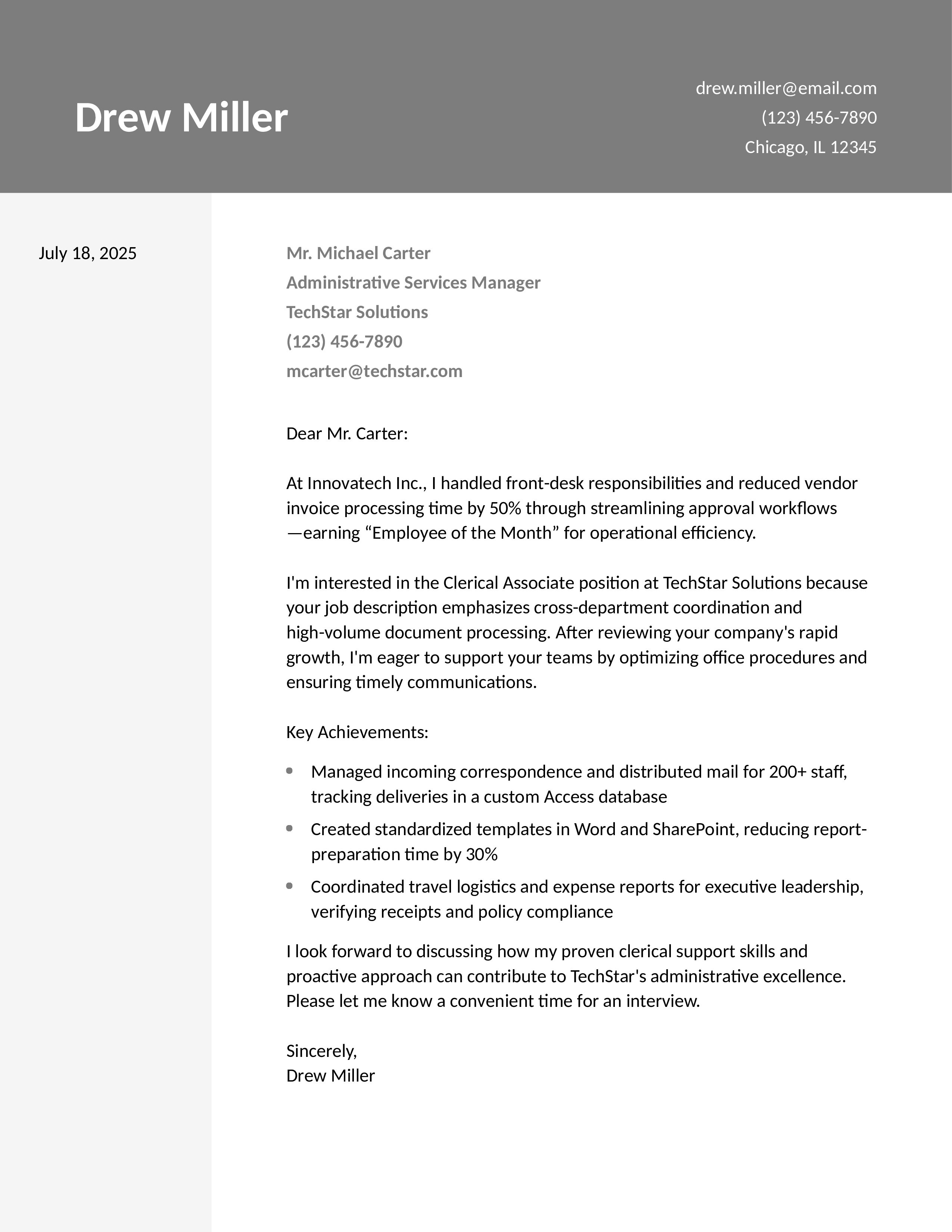
Our templates are crafted by professional resume writers to make creating your resume quick, easy, and effective.
- Professional resume template downloads
- Customized cover letter generation
- AI resume writing support
- Career-building resources and advice
Clerical Text-Only Cover Letter Templates and Examples
How To Write a Clerical Cover Letter
To be effective, your clerical cover letter needs to set a clear focus. Even more than the resume (which may have non-clerical recent work), center your cover letter on whatever details qualify you for the job opening at hand. Below, we outline what to include in a cover letter and explain how you can properly focus each section.
1. Heading
At the top of the page, include:
- Your resume contact header, which should give your full name, address, email, phone number, and LinkedIn or other social accounts if applicable
- The date
- The recipient’s name, title, organization, and contact information (when available)
(Note: Feel free to omit this section if you send your letter by email and your contact details are part of your signature.)
Example
Anthony Gentile
123 Convoy St, San Diego, CA 12345 | (123) 456-7890 | [email protected]
August 15, 2024
Ms. Rachel Johnson
Hiring Manager
Creavey Manufacturing
(123) 456-7890
[email protected]
2. Salutation
Address your recipient by name as in the first example below – this is the quickest way to show you’re sending a job-specific letter and not a boilerplate. If you can’t find the person’s name, use a variation of “Dear Hiring Manager” so your greeting is still tailored somewhat to each job opening.
For traditional job applications, end your salutation line with a colon. But use a comma instead if you know your recipient or the employer has a casual work culture (sometimes revealed by the job posting). In rare cases, you may also trade out the standard “Dear” for a more casual “Greetings,” “Hello,” “Hi,” or even “Good morning.” Use your discretion and take cues from the job posting or company website when possible.
Examples
Dear Ms. Taylor:
Dear MFC Bank Hiring Manager:
3. “Hook” or introduction
Catch the reader’s attention by citing an achievement from your work history or a key credential the employer seeks in applicants. Feel free to adapt a bullet highlight from your resume, as some repetition across documents is fine and can make your job application more cohesive. But choose carefully. The highlight that opens your letter is often your first impression on employers. Select one that’s compelling and relevant to the job so managers can quickly envision you adding value to their company.
As an alternative to the work highlight approach, you can set yourself apart by networking. Begin your letter by citing any personal or professional connections you have with the hiring manager. If someone at the organization alerted you to the job, use a line like “I was excited to hear from your colleague [Name] about [Company’s]’s new clerical position.” Or, if you’ve already met your recipient, mention that with a line like “It was great speaking with you at the job fair last week.”
Example
Over my past two years as a law clerk, I’ve introduced data entry processes that raised efficiency by 35%. I’m interested in helping your firm make similar strides in enhanced office administration.
4. Job- or employer-specific paragraph(s)
Here’s where you can bring your candidacy into sharper focus. Read the job posting again closely, then write two or three sentences in response to it. What details about the clerical job or employer caught your attention? Do you identify with the company’s stated mission or values? If so, how? Consider quoting text from the job posting that resonates with you. With this targeted approach, you can show the hiring manager you’re interested in their specific job opportunity.
Following this explanation, cite a few more of your skills or achievements, possibly as bullet points.
Example
I’m a self-directed clerical assistant with over five years of experience refining these core strengths and attributes:
- Adaptability – Quickly learn new business systems, scheduling programs, and automation software
- Organization – Maintain detailed, accurate records of customer correspondence and account updates
- Initiative – Offer ideas to continually improve operations and deliver high-quality work with minimal oversight
- Tech savvy – Apply advanced knowledge of Microsoft Excel, Outlook, and SharePoint
5. Conclusion
Finally, request an interview and thank the hiring manager for their consideration. Consider briefly restating your core skills to carry the letter’s focus through the last paragraph. To end your cover letter, use a simple closing like “Sincerely” or “Best regards” and then your name.
Example
Please call or email me to arrange an interview. I will follow up soon to confirm you received my resume and see if you have any initial questions. Thank you for your time and consideration.
Sincerely,
Kevin Morrison
Clerical Cover Letter Tips
1. Show you can handle varied office work
Start your letter strong with an example of your success as a clerk. Think in terms of how you’ve honed office functions. For instance, maybe you found a more efficient way to schedule meetings and business trips. Or, given the varied nature of your role, you might choose an example that shows you adapt quickly to new work conditions.
Example
In my current role as office assistant for XYZ Supply Corp., I’ve streamlined email communications with clients, helping raise our customer retention by 22%. I’d love to uphold that same level of service at Creavey Manufacturing.
2. Tell why you’re a good fit
Show interest in the hiring organization by describing your similar clerical or other work experiences. Based on the job posting, what does the role have in common with your background or goals? For example, maybe it’s one of the many clerical jobs in health care, a sector you’re eager to return to. Or maybe it requires polished phone communication with clients, an area you’ve been praised for in your current job.
Example
Your job posting jumped out at me, particularly the call for someone who is “strategic, collaborative, and relentlessly focused on making our office run smoothly.” This is precisely the reputation I’ve developed through my over five years as an office assistant.
3. Highlight your administrative skills
Add a short list of bullet points to display your success in key work areas for a clerical assistant, such as data entry, call routing, or time management. With each bullet point, use strong verb phrases to show the skill in action. For instance, if you want to show your documentation skills, you could write, “Gather, analyze, and draft summaries of legal research from various credible sources.”
Example
During this time, I’ve reinforced the following core strengths:
- Combine steady focus on due diligence with a willingness to try creative, practical new office administration methods
- Balance multiple tasks and priorities in a demanding, fast-paced corporate environment
- Meet deadlines consistently while upholding high standards of compliance and accuracy
- Work independently or on a team in an equally effective manner
Clerical Cover Letter Frequently Asked Questions
Do I really need a cover letter for my job search?-
Yes, in most cases. Job postings today usually require or allow you to send a cover letter along with your resume. While not every hiring manager reads or prioritizes them, a well-crafted letter can only help you stand out from other applicants. It will also clarify what points to emphasize during the interview.
What traits are useful to highlight on my cover letter?-
Desired qualities in office clerks include diligence, organization, and a service mindset. Consider which of these traits best describe you, then give an example or two of how you’ve shown them in a work setting.
How long should my cover letter be?-
No more than one page, or around 250 words. Resist the urge to tell your whole career story, even if you have an extensive background as a clerk. Give just enough detail to pique hiring managers’ interest so they look closely at your resume.
Craft a new cover letter in minutes
Get the attention of hiring managers with a cover letter tailored to every job application.



